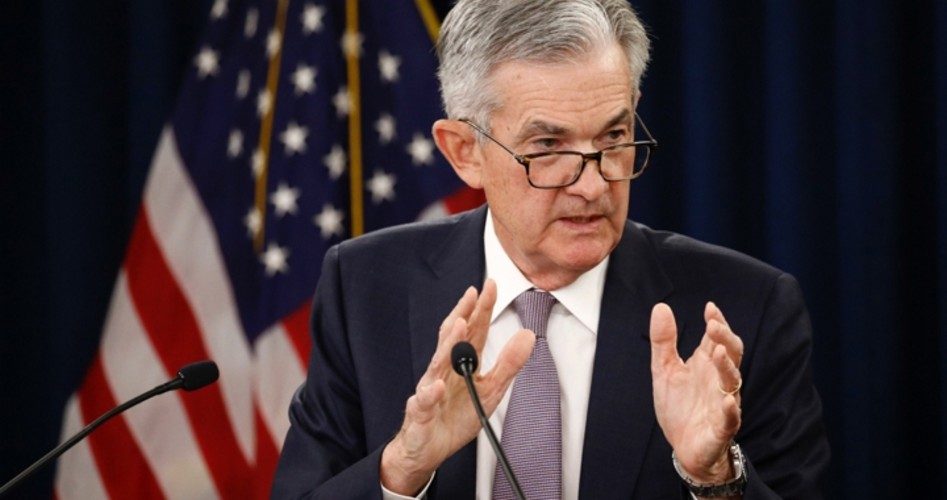
Podcast: Play in new window | Download ()
Subscribe: Android | RSS | More
Federal Reserve Chairman Jerome Powell (shown) is walking a tightrope: Seven of the 19 members of the Federal Open Market Committee (FOMC) wanted lower interest rates, while the remainder was split between keeping them steady or dropping them even further. He admitted as much in his announcement on Wednesday that the Fed was cutting interest rates by one-quarter of one percent, the second such cut in two months.
In his effort to be transparent, Powell sounded weak and unsure: “There will come a time, I suspect, when we think we’ve done enough [cutting of interest rates]. But there may also come a time when the economy worsens and we would then have to cut more aggressively. We don’t know.”
Jerome Powell, the head of the central bank of the largest economy in the world, doesn’t know?
He explained: “It’s an unusual situation. Our eyes are open. We’re watching the situation…. We are going to be highly data-dependent … we are not on a pre-set course. We are going to be making decisions meeting by meeting.”
His council of advisors — the 19 gurus sitting on the FOMC (only five of whom have votes) — disagree with the proper course of action in light of that “unusual situation.” Seven of them are expecting a third rate cut this year, by another quarter of a point, while five think there will be none before the end of the year. And five of them were opposed to cutting rates this time.
The analogy of the little boy playing with his brand new chemistry set is apropos: mixing the wrong ingredients could blow up in his face.
Rex Nutting, the Wall Street observer for MarketWatch for more than two decades, agrees: “Fed Chair Jerome Powell doesn’t know the answer, he knows he doesn’t know, and he knows you know he doesn’t know. So quit asking.”
The list of what Powell doesn’t know is staggering: He doesn’t know what’s happening in the economy. He doesn’t know if a recession is coming. He doesn’t know if his council of advisors will be able to react in time if a recession does show up. He doesn’t know if investors should buy stocks or sell them. He doesn’t know if people should buy a new home or refinance their present one and just stay put. He doesn’t know if business owners should expand or sit tight. He doesn’t know how the trade war between the president and the communists running China will turn out.
And yet he is arguably the most powerful individual on the planet. He is the head of the central bank of the largest economy in world. The dollar is the world’s reserve currency. Nearly every other currency is pegged to the dollar. A quarter-point move in interest rates reverberates across the globe.
And yet, Powell doesn’t know, and he knows that you know that he doesn’t know, and he wants you to quit asking?
Added Nutting: “Don’t pay any attention to our forecasts [either] … because we really don’t know what will happen next. We have no faith in our forecasts, and neither should you.”
It turns out that the best person to answer those questions isn’t Powell after all, but the American consumer. And by nearly every metric, he is one happy camper. He is spending more for new cars in greater numbers than ever in history. U.S. retail sales in August rose 0.4 percent from a month earlier, and they rose 0.8 percent in July over June, far exceeding forecasters’ expectations. U.S. homebuilding surged to more than a 12-year high in August while building permits jumped to their highest level since May of 2007. Reports from the Mortgage Bankers Association showed that applications for mortgage loans continue to increase.
But of the “smartest” 17 people on the planet — the members of the FOMC — seven of them are “penciling in” (as the Wall Street Journal expressed it) at least one more rate cut by the end of the year while the other 10 are split between leaving them alone and objecting to Wednesday’s quarter-point cut.
So, the Federal Reserve is being run by people with fancy degrees in economics from fancy Ivy League schools and is based on majority rule?
It’s probably not helpful to remember that a camel is a horse designed by a committee. It’s also not helpful to remember the announcement from the pilot of a commercial airliner who told his passengers: “We’ve lost our radar and we don’t know where we are. But we’re making great time.”
Photo: AP Images
An Ivy League graduate and former investment advisor, Bob is a regular contributor to The New American, writing primarily on economics and politics. He can be reached at [email protected].


